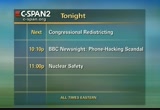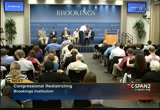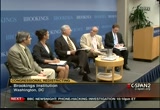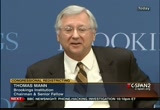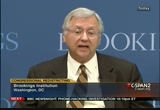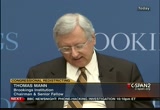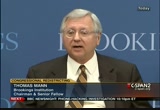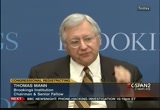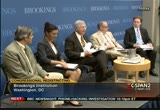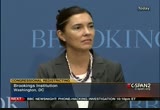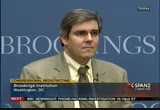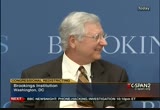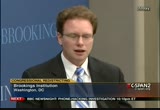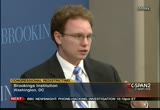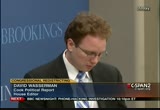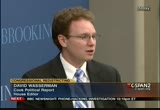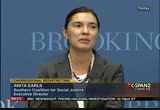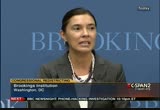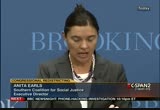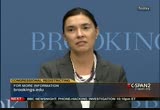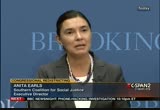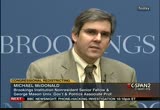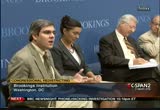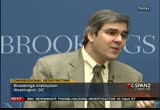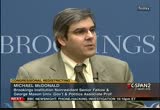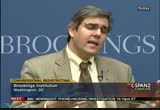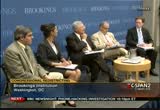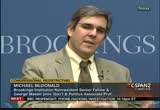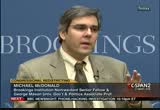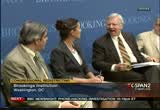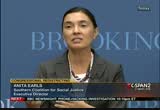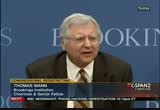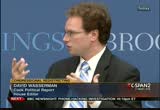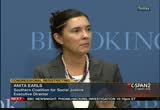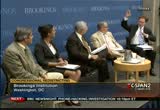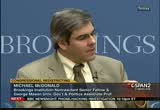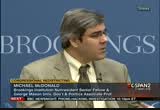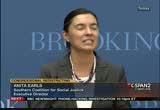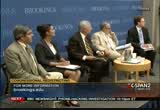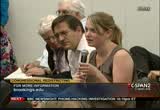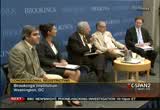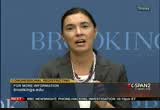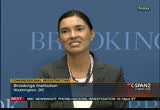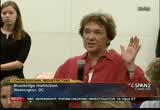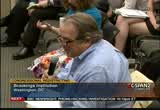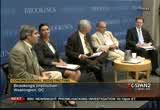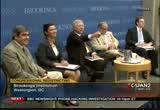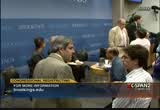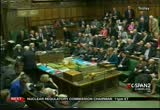tv Tonight From Washington CSPAN July 18, 2011 8:30pm-11:00pm EDT
8:31 pm
institution forum on congressional redistricting plans that are being considered around the country. u.s. house districts are redrawn every 10 years to reflect population shifts. so far redistricting plans in 15 states have been challenged in court. over the next hour and a half panelist look at redistricting plans in california, florida and texas and how communities are being affected. >> the bewitching hour has arrived. it is 10:00 a.m.. i am tom mann, senior fellow here at workings and i'm delighted to welcome all of you with us here at brookings this morning, and to our lives c-span audience to a session entitled, a status report on congressional redistricting. now, you may have noticed on the screens, who redistricting di.
8:32 pm
wondering why that is there. we understand some of you are compelled to tweet wherever you are and if you do, we want you to know that is the event hashtag. i know you are shocked that i actually said that, norm, but there it is. >> it was written down for you. [laughter] >> eye in i am the well-known tweeter. six months ago, we had a session here almost to the day, that was a preview of the redistricting session. today we are going to take stock of how that process is unfolding and with what consequences we can detect at least now. why do people pay so much attention to redistricting? a good question. first of all, it is a fascinating game. political junkies simply can't resist. we can start talking about it
8:33 pm
the midterm election before and continue on for years after as we try to discern the consequences of it. but more importantly there are gentlemanly high stakes involved in redistricting. certainly, it is relevant to play control of the house where democrats now need 24 additional seat gains to regain the majority. obviously, as it plays out in state legislatures and local governments, it has a bearing on partisan control there as well. it is certainly important as far as minority representation. a substantial majority of a
8:34 pm
population gains since the last census have been among my already's and the question now becomes, will those population gains be reflected in seats. in the house and at other levels of office. finally, redistricting has some bearing, disputed to be sure, not dominant of course, but nonetheless, important for competitiveness, for responsiveness and four polarization. i think for all of these reasons, one has to with knowledge the stakes of this process are unusually high. it is also important to reemphasize the fact that the u.s. is truly an outlier in the democratic world when it comes to the political control of the
8:35 pm
administration of elections. we won't today talk about the sec or the eac. we won't be talking about new state laws on voter i.d.'s, early voter registration. all of those are caught up and shaped very much by the political and partisan struggles that exist in this country. instead, we will be focusing on one aspect of that, namely redistricting. i think it is also important because of some of the new initiatives that have been taken on the redistricting process. perhaps the most interesting and visible is the switch to an independent citizens commission in the state of california, which is unfolding as we speak. david wasserman among others has
8:36 pm
reminded us how little time over there has been in the california u.s. house delegation over the last decade. when we had three truly dramatic electoral swings between the parties. simply, the state of california was insulated from that process. the question becomes, does that game change? now florida passed a couple of initiatives that have tried to impose some discipline on that process. right now, the swing state of florida has 19 republican members of the house and five democrats as i recall. it may be the sharpest, strongest partisan gerrymander in the country. will these new requirements
8:37 pm
approved by the initiative process have any bearing? we also have ongoing efforts to really increase the transparency of the redistricting process and in particular efforts to try to get citizens involved in mapmaking themselves. we fortunately have a wonderful panel to talk about all of these matters and others today. our planned this morning is to begin with initial presentations then we will have a discussion among our panelists and finally we will take questions from all of you. i am going to introduce our panelist in the order in which they will speak. we will begin with david wasserman, who is down here to my left. david is the house editor of cook political report.
8:38 pm
he is responsible for handicapping and analyzing house districts. last year, david rhodes, author, put together a volume called better know a district which is the bible for this round of redistricting. it is a wonderful piece of work david and we have all come to rely on it. david is going to get us off with an overview of where we stand and how the process is unfolding. then we are going to turn to my colleague immediately on my right, anita earls, who is the founder and executive director of the southern coalition for social justice, a nonprofit organization in their am, north carolina. i need it has been a civil rights lawyer. she has been deeply involved in voting rights and in
8:39 pm
redistricting, and she will speak on a topic of enormous interest. as i said, the population growth has been among minorities, but it isn't yet clear that growth will be reflected in speech. she will give us an overview of how that is playing out in a number of states and how quickly we have or will be moving into courts on that process. we will then turn to michael mcdonald, who is a nonresident senior fellow here at brookings, associate professor of political science at george mason university. someone who has been a consultant to redistricting authorities including arizona, redistricting commission, who has launched through brookings and aei as well as the public mapping project, and will tell
8:40 pm
us of the efforts to really increase public participation and transparency in this entire process. we will then and with my colleague, norm subward, a resident scholar at aei who everyone knows appropriately. norm is going to tell us after hearing from our other three colleagues, what it all means for politics and policy. so that is the game plan. david, kick us off. >> thank you to brookings for giving so much love to and often under love topic, but i often call redistricting a once in a decade nerd fest for politicians, pundits, academics, lawyers demographers, cartographers you name it. i am pleased to see so many nerds out here in the audience. i definitely am one.
8:41 pm
god knows, but redistricting is really one of the only arena is it not the only arena in which it is fair to compare lebron james and dennis kucinich. i really don't think that dennis kucinich even if he decides to take his talent elsewhere perhaps the two washington state, will do any better in terms of winning. that i really think the examples of how redistricting affects our politics are everywhere around us. even if they are not necessarily part of the news articles that we read on major issues at stake these days. during the medicare fight for example, i don't think glass tyranny of us could have predicted that paul ryan or the state of wisconsin would generate so much attention and coverage this year in terms of the fiscal woes facing the state and paul ryan's budget and i think a lot of the attention on the district has been replaced because democrats are saying well we have got the kenosha
8:42 pm
county supervisor and a lot of pundits, a lot of people you've talked to in the consulting world. very few of them who are credible would give him a chance of taking it to paul ryan. but i do find significant in his district, and if you plot out all 435 house seats on the scale of the most republican districts have the most democratic districts in the country, on a scale of the partisan voting guess which one is the 218th district, the fulcrum of the house? it is paul ryan's district and i think are made is a perfect illustration of why it is going to be difficult for democrats to get to that magic number of 218 in the house. not only because of a personal appeal but because before these recall elections in wisconsin republicans are trying to edge near a plan that will make his points more republican. redistricting is a game of moving goalposts and another goalpost and that is moving right now is the ability of
8:43 pm
republican leaders in the house to corral a lot of their members to get behind any kind of deal on the debt deal. how does redistricting factor into this equation? well it is not as difficult to pass any kind of package thanks to the line in the sand drawn by 60 members of the tea party caucus in the house. that is one out of every four republicans in the house. but if you take a look at what is happening in redistricting just about everyone will have to take on new voters in that means that we have a whole slew of republican incumbents in the house beyond just those in the tea party caucus who are affected by taking on new voters and looking over their shoulders for potential primary challenges. and i think that is really making it more difficult for anyone to break from a hard line on that subject. but today's subject is a status report on congressional redistricting. we are done in 10 states which means we have 33 to go and seven
8:44 pm
states that need redistrict because they only have one district. if we are keeping score of which party is more like it again seats in certain states, where there writing is basically on the wall at this point even though only 10 have completed congressional redistricting we can really say a lot more about what is likely to happen in the rest of the states that have shown their hands thus far. democrats are likely to pick up a seed seat or republicans are like you to lose a seat in louisiana, maryland, nevada, washington. republicans are likely to gain a seat or democrats are likely to lose a seat in georgia, indiana, massachusetts, michigan, missouri, pennsylvania, south carolina, utah and i am leaving out north carolina and illinois because those are the big jackpot states with a really driving party potential for gain. than i have a question mark as far as which party is going to
8:45 pm
gain a seat or lose a seat and it could be a fair fight in states like iowa, new jersey and arizona are go but i'm sure the five states we'll be talking a lot about this morning and i will stop short in going on depth in this are illinois and north carolina which are opportunities for partisan capitalization on this redistricting. illinois for democrats picking up potential a five or six seats or four or five seats republicans losing five or six and illinois. north carolina where i put republican gains have possibly three seats be the -- depending on the legal challenge to the mass republicans are proposing and then california where he think democrats at the end of the day will probably pick up two or three seats as a result of the entangling of california's uncompetitive line at the moment. texas where i expect republicans netting two seats depending on the legal challenges we will be talking about in in the wild wild-card being florida. i am sure we will make that a
8:46 pm
big part of our discussion. but, there are two ways to measure how redistricting affects the sure in the house. you can look at it in terms of the scorecard that i just went over. if you add up all of those columns, which seat is going to end up ahead at the end of the day? i think it will be very close to a wash depending on florida. i think possible democrats could pick up a handful from the process which is surprising given republicans earn so many state legislative chambers and picked up so much control in 2010. but then, the other side of the equation is really how much can republican shore up the gains that have been made in 2010? and that is a part of the equation that has been more difficult for a lot of us in the pundit world to call a -- quantify. but one measurement that was kind of suggested at real clear politics.com and i appreciate this more than a lot of other metrics that have been thrown
8:47 pm
out there is how far to the right does it move as a result of republicans in pennsylvania and ohio and michigan? they have control of shoring up a lot of the gains they have already made in 2010. i think the answer is that on balance that 218 seats in the house, the seats that democrats will need to win on average to pick up the majority in the house will move two points to the right. that is where it is today. maybe from a district that is two points more republican than the national average, and we will probably get one or two points wider as well because the trend we are seeing in so many states as for underpopulated minority districts to spin into the suburbs and rob barry competitive suburban piece of the democratic voters that make them competitive or has made them competitive in the last few years. at the end of the day candidates and campaign still matter and that is why even after this
8:48 pm
process is completed and even after we have this new district lines there will be plenty of unintended consequences for us to talk about more than a year and a half from now. so, i look forward to hearing what others have to say. >> terrific. thank you for getting us off to such a good start. >> thank you and good morning. i'm really honored to be here and i want to thank the brookings institution for inviting me and giving me an opportunity to talk about what i have been focusing on through the redistricting process is what is the impact on minority communities? so i want to talk a little bit about that and talk about the legal standards of playing a role but then also see a quick word about the impact of technology on the process, what we are seeing and community involvement. but to start with, how are things shaping up so far for the interests of minority voters? it is very important to consider latino populations and they are looking differently than what is
8:49 pm
happening with african-american populations. i think across the country it is fair to say that the real concern about the fact of the huge growth of latino population is not being reflected in the states where their new there are new congressional districts being drawn and those populations feel that their voting strength is not being fairly reflected in those maps that have been proposed and drawn. so, in texas, the maldef and several other latino organizations have filed suit. last count there were five cases and a quarter and several in -- already filed how districts have been drawn. some of those claims are based on the fact that they increase in latino population was an reflected in the maps of the past. similarly the plans that have been with forwarding california, you may have read in the news ahead of the layout talking
8:50 pm
about an extreme frustration and disappointment that those maps are actually hurting latino districts and not reflecting the strength and not stay. so i think so, with the latino population i think it is fair to say that they are very concerned and ready to go to court because of the plans that a pass or not reflecting their voting sings. with african-american population i think the situation is a little different. their growth is not across the board grade in the states and they also i think possibly to a larger degree have a little more history of having majority minority districts drawn in being able to elect candidates of their choice. so they are, does harder to say nationally what is happening. a lot depends on whether they are in a winning or losing district, which parties in control of of state and how the voting rights act works in that state. we have states that are covered by parts of the voting rights act of states that are not
8:51 pm
covered. i will give two examples though that show some of the nuances when they were looking at the impact of the voting rights act in this round of redistricting. let me talk about north carolina for a minute, because the first congressional maps that were proposed by our republican controlled legislature north carolina actually increase the minority percentage in both of the states to congressional districts. and, throughout the state, african-american leaders were unhappy about that and the reason is because they felt that was actually training baron funds her mother congressional districts in the state. so where they had a history of being able to elect a candidate of choice in a district that was 42% african-american, they don't want that the district to be packed. what they would call pat into a -- an interesting contrast is the situation with latino voters in nevada, where there is a question of whether or not they're going to make the trade-off between being a majority in a single district
8:52 pm
are having a greater influence in more than one district. but, i certainly want to say more about the impact of technology because they think as we are looking at this redistricting process unfolding, i expect the technology would make it easier to draw mass but i think it is making it easier for public involvement in a lot of different ways. i never knew you could tweet about redistricting but apparently you can. but also all the web sites. they not only give you the opportunity to draw maps but to really get a lot of information about the process and stay up to date very easily about what is happening. in north carolina they did the process of having simultaneous public hearings throughout the state so for the first time you could go to one location and here from citizens. i think they had six or seven different videoconferencing sites and those are very long public hearings. they were using technology to really facilitate public involvement. so my third is about public
8:53 pm
input. there i will say what i am seeing is that what is most impactful is where you have groups coming together and trying to draw unity plans are really trying to coalesce behind a plan that simply having individuals submit something in the legislative process is not as much of a check on some of the excesses as when you have nonprofit organizations that leaves coming together behind a single planet really working through the process. so that is something i have seen this time that hasn't happened before. >> thank you, nita. >> my name is michael and i'm a recovering gerrymander. i've been involved with redistricting since the late 1980s and have been a redistricting consultant now in nine states. and, the experience of being in the room and talking to legislators about your districts and hearing a lot of gripes about what we are doing to their districts led me to realize that
8:54 pm
this is a very arcane process that the public is not engaged in, and really at the time in the 80's and 90s and in the last decade, really couldn't be involved and because the decisions were being made using technology that cost a substantial amount of money. at data best -- databases that were very difficult to use in just a technology than was an impediment to greater public dissipation within the process and also caught consequences of having restricted public participation and less transparency. people could really understand what the trade-offs were of different british game plans being offered by state legislators and the media basically had to take the state legislators word that was the only plan that was feasible and there were no other alternatives that were available. this is the way the world had to
8:55 pm
be. so over the last decade, working with a partner of mine at harvard, mica altman, tom and norm through brookings, a really wonderful advisory board of good government groups and bipartisan by the way as well so there are people on both sides, both democrats and republicans who see this process and know that it is not a good system we have in place here. we moved forward in providing this technology to the public. something else that has changed over the last 10 years and we talk about tweeting and other things, is the internet. the speed of the internet and the penetration of the internet. so it is possible now to actually run redistricting software through web browsers. that is what we have done. we have created software. is available on publicmapping.org and it allows the public to draw their own redistricting plans and we
8:56 pm
infused the software with the data necessary to evaluate the plans that are being drawn as well so you can actually see what the political consequences are. it is a very complicated process because there is live data to be managed and software, so still there is a big hill to be climbed here, but we are trying to shoulder that burden as much as possible so that the public can be more engaged in this process. so what have we done up to this point? we have supported research giftings -- redistricting competition in virginia. there is one in arizona which will conclude this week. there is one in ohio which will start this week and we are discussing potentially doing other competitions in the state of new york. so, one of the ideas that we have had in let's get the public involved and offer prizes to the best districts that people can
8:57 pm
draw and have a panel of judges and again tom and norm were very gracious and agreeing to be the judges for virginia competition. so that is one of the ideas. at a high level we could have a competition and again you have to have organization that is involved with that. another level you could just open up the process so that either individuals or groups would have the same software and data that the redistricting experts have. we have been helping our groups or individuals in states like massachusetts and new mexico and other places to draw a map and take some advocacy efforts based on the maps they have been able to draw. so, lower level would need to sort of just let's open up the process and allow the public to draw up some plans. what have we seen from this? well we have seen that it has actually been impossible for
8:58 pm
people to draw a legal redistricting plan. at the outset when the criticism we had even before we attempted this was to say you can't do this. it is such a complex enterprise that it is not possible for somebody in the public to do it. only experts are -- have the ability and the skills to draw legal redistricting plans. well, can tell you from our experience in michigan the second-place congressional map in michigan was drawn by a 10-year-old. [laughter] a lot of the editorial boards in the state of michigan said that 10-year-olds at a much better job than the state legislature did in drawing congressional plans. there is more political fairness, more political districts. it didn't quite do is well on county boundaries but still, it showed that a 10-year-old could do this. in fact, that is what we found, that younger people really do
8:59 pm
engage in this. it is like a videogame for political junkies to draw these redistricting plans and in virginia we had, it was more of a student competition led by faculty members across the state. we had 15 students -- 15 at 13 of the state colleges and universities dry reducing plans. we had 55 plans are withdrawn and some of those plans actually were submitted as bills. so again it is actually possible that college freshmen, a 10-year-old, senior citizens, advocates, it is possible for the public to be engaged in this process. what did we learn from this? it is that there are alternatives to what the legislature legislature is putting forward that do better on some of even the constitutional requirements in some of the states. for example in virginia there is a requirement.
9:00 pm
many of the student maps in virginia did much better than the legislature's maps on -- for example. we also learned by opening up the process very broadly and having looked at this problem you can see new ways of approaching some of the issues that are very involved and important in redistricting such as minority representation. so one of the student plans in virginia showed an alternative way of drawing a congressional district that enhance minority representation and essentially, the black caucus within the state legislature took that map and said this is a good idea and they implemented that and that became the concept for their proposed map for congressional mapping in virginia. now virginia has a divided state legislature. we haven't actually seen a map that can pass the state legislature so it is possible that one of the student maps may be adopted by a judge or a plan
9:01 pm
adopted by a judge so there is even an a possibility that we may cross that magical threshold which i would have never dreamed possible that we could actually see some of these ideas really put into effect. it is a whole different way of even thinking about how we can do democracy in the u.s., where you could have the public arts vertus abating and engaging, offering real policy alternative and having those implemented. to whether things we learned very quickly. one as i already alluded do we in foreign-policy, they learn about these alternatives and they took some of these ideas too hard in the way in which they were drawing the districts and then we also educated the public quite a bit because it is one thing for the media to comment as one of those talking heads about redistricting. is quite a different thing for them to go to an institute or a 10-year-old and asked them about
9:02 pm
how did they approach redistricting? it changes the story from being something about process to putting a human face on it and we have had wonderful media coverage of these efforts both local and national media. and, finally as i said, we have shown that there are these alternatives that we can inform the policy making and show there is a better way of doing this. as we come out of this experience, i am hopeful that seeing how we have opened up this process that we can have a real discussion about what these policy trade-offs are and how can we go about implementing them 10 years from now? >> thank you, michael. norm. >> thanks, tom. it has been a real pleasure working with michael and his colleague. tom and i had quite an experience judging those virginia plans.
9:03 pm
tom is the simon cowell. >> and you were? >> unfortunately i was paula abdul i guess. [laughter] i will have to recover from that. i want to step back a bit and start to look at or think about a couple of questions. this really does become, call it market wonk fest which i think is a better characterization then there had. wonks perhaps you know is no spelled backwards. but, really at the root of this, beyond the competition, the viciousness, what it means for partisan balance is a broader concept of representation. one of the worrisome elements of the way we have been doing redistricting -- this was amplified a few years ago when texas under tom delay went at this twice in a decade in creating a different precedent. but if you think about length
9:04 pm
between voters and their representatives, even beyond what has now become the most powerful critique of redistricting as we have and voter should choose their representatives rather than representatives choosing representative choosing their voters it is becomes more difficult to link a representative when there is turmoil and from one round of redistricting to the next to really don't know where you are going to end up in what kind of representative you are going to have, whether you will have the same one of whether you are going to feel any sense of a community around you but people who are represented by a person because of some of the convoluted lines that have been drawn. so that has become i think a more significant problem. at the same time, it really is interesting to reflect on how the redistricting process in many ways has changed to reflect the changes in our politics. the last four ways in the 80's, the '90s and now are somewhat different from what we saw in
9:05 pm
the past. politicians naturally always want to maximize their own advantage and the pre-permanent campaign era of the theme was much more the incumbent protection one. the two parties would tend more to get together and say you protect your guys and we will protect ours. now, of course there is some of that depending on the state and the dynamics and who is going to control but it has become much more vicious. i think of it in this way. in an earlier era to us more about solidifying the goalposts and now it is as david said about moving them and moving them as much as you can. all of that is not just the permanent campaign in the high-stakes, the stakes growing higher as we have seen more turmoil in our politics. it has all been amplified at the supreme court, which is clueless to be truthful about the real world, especially when it comes to this area. as they have through a succession of decisions basically maniacally focused on one person, one vote.
9:06 pm
and the way in which they have focused on one person one vote is the height of absurdity. because they have for jack to districts that get down to a tiny number, little more than a handful of variation out of 600,000 people but all based on census data, that is antiquated before the ink is dry on the census forms because of population movement. so by doing so, especially in the air of powerful computing, they have made it much much easier to do than just vengeance to communities of interest, to county and county and other kinds of lines to compactness and other things. and it is becoming even more absurd excess of course from the beginning we have drawn house district lines within states, and because of the wide population of variations now and particularly because we are having more and more states, smaller states that are losing
9:07 pm
population, that one person one vote doesn't work very well. if you have a state that has a representative but has a population of 300,000 then as you try to move the districts around we are going to end up with districts that are millions of population. how you can reject a plan because it varies by 100 people out of 600,000 said that likely well you have one district that has a representative three times as powerful in terms of the number of voters as another is something that only anthony kennedy knows in his own mind, i guess. but it adds to our challenges. and let me add, one result of the way we are doing the redistricting now and the way some of these dates are playing out in the wide kinds of variations we are seeing even as we are seeing some interesting developments in places like california and florida that are trying to move it out of some of the vicious politics that have
9:08 pm
occurred between the parties is i am afraid, whichever party gains or loses this time pushed to the side, one result will be more polarization. if you look for example at what is likely to happen in north carolina, you have got three representatives, democratic representatives who are in very serious jeopardy right now. kissell, schuyler and mcintyre all of whom are among the remaining dwindling group of moderate to conservative lou dog democrats. and that if you look through a lot of these states, they are often the ones who are going to be on the chopping block in states where republicans are going to be able to gain a little bit more leverage. now it is not as if we have got moderate republicans left who can move onto the chopping block but as we have seen the kind of console -- what it is going to do in many of these districts is put even more for premium on the primary is the one place where a challenge can occur.
9:09 pm
and it is in those places that we see this kind of electromagnetic that either nominates more conservative candidates or takes the representatives who are there and pushes them in a different direction because they have got to respond to a smaller group of pure voters. and at the same time we are going to end up with many fewer heterogeneous districts. the process we have been describing here is far more bad of moving as david said many of these republican districts to be even more wide than they have been which is wider and wider over the last few waves anyhow and although there are some exceptions to this, pass them into their district, homogeneous districts when they go back home. as we can see with the dynamics now on the debt limit, that echo chamber which means that you can share a common set of facts or
9:10 pm
feel any fiduciary responsibility to represent people whose views may be different from your own because they are not a part of your district makes it harder to find the center come to an agreement. so those are some of the reasons why tom and i have joined with michael and mike to try to create at least a little bit different dynamic in this process to raise some of these other areas that the court has basically pushed to the side from compactness to communities of interest to even competitiveness, to try and figure out a way to alter the dynamic war to get the public thinking a little bit more so that we can have whatever occurs and a fight in which clinical figures are going to naturally try to maximize their advantage either personally or for their party. that is just the nature of the beast but to try and keep from having some of the worst other elements that can emerge from this process.
9:11 pm
>> thanks, norm. that last point he was making sort of underscores an important distinction that i think we all should keep in mind. you will oftentimes here people argue that the reason we have such extreme partisan polarization is because of gerrymandering. that is wrong. it has contributed, it has contributed but it has not it it been the dominant factor. but, ironically, gerrymandering has become more great consequence of polarization. that is, it sets up things in a way that leads to an exacerbation of an underlying condition and so the effort at reforms are trying to break that dynamic in some way. in that spirit, i would like to turn our conversation to california if we could.
9:12 pm
these are experiments in reform, one with new criteria imposed on a process, the other with a new process replacing the old one. david, would you kick us off on that? you have been watching california. earlier, he said it was like watching paint dry to see the commission out work. share that with us. >> last tuesday we had as some of you know a special election in california, 36 districts replacing harman. the winner was janice hahn and she won that election tuesday night. on wednesday, the commission put out a visualization of a hypothetical district gave respective district that would shut -- throw janice hahn into a district with henry waxman so welcome to congress on tuesday. now run against henry waxman on
9:13 pm
thursday. >> welcome to california. [laughter] >> watching california commission has been, has been really really amazing for someone who focuses on insider congressional baseball. if only because of this really brave new world. it is the largest laboratory of reform in the country and redistricting right now, and redistricting california's like trying to partition a melting pot. you have given her hats the most complex redistricting job in america to a group of people who were selected in part by -- sending in their resume. and the result has been a 14 member citizen commission that is earned plenty of criticism from the outside for, for example, picking a mapping firm that republicans argued had ties
9:14 pm
before two democratic perspectives. but i give the commission and watching their meetings even if it is like watching paint dry, higher marks than most people would have guessed they would give them early on in the process because watching them work together as a group of 14 and very tedious, tedious meetings to come up with new maps is impressive in terms of the tone and collaboration since we have other commissions across the country. we have seven congressional redistricting commissions but this is really the only one out of the seven that doesn't have some political component in the process watching over their shoulder for appointing the commissioners, and they really are accountable to no partisan overboard in this process. so in part, their cooperation i think it's very very refreshing
9:15 pm
and succeeded and untangling california's very uncompetitive line and generating even five or 10 congressional -- if there are 53 scared incumbents at the end of the day. i think california could be held up as a model of reform to speak nothing of potential political sway in democrats or republicans favor as a result. norm said earlier that the things that corporation may be un-american, given the climate in washington these days, but i think it will be a very useful example of how putting the power to redistrict into the hands of people who are closer to the average -- being average citizens could really have beneficial effects for both the competitiveness of congressional elections and putting the power back in the hands of the people instead of the other way round. >> michael, what do you think of the criteria you see in
9:16 pm
california? that is, politically blinded many respects. they don't know where the incumbent resides. presumably you can't use past electoral data or party registration data. some have argued, well that is the way to go. ignorance is bliss and you know if you don't take politics into account that won't distort the process. others say that to achieve political fairness, you need to take politics into account. >> right. i am an academic so i can argue with myself. [laughter] i will take the argument against the commission just for a second so we can have that voice here. what this commission is and what david has set up by his example of at the very beginning is that it is term limits by another name. so you are just going to shake it up quite a bit and you are going to see where the seeds
9:17 pm
fall and if you are lucky enough at the end of the music to be able to have -- great. you get to serve another term in office. if not, that is your exit. there are people who say if you really want to have term limits you should have term limits rather than do it through redistricting and i also say that these legislators, these members, they are the people who best know their districts. so they are the ones who are best capable of drawing a district that will reflect the interest of the communities for their districts. now, again i'm an academic and i can argue with myself. the counter would say to that is if we can just get one good set of districts that follows some good criteria, then we aren't going to have this problem again because if you are following political boundaries and respecting communities and doing other things that is going to be the baseline 10 years from now
9:18 pm
where the incumbents are going to want districts to be drawn. so if we could just get over this once of putting in place good criteria, then i think in the future there will be much less politics involved in this because it will just be sort of a mechanical process and many countries around the world do this. they are just following this criteria. the criteria themselves, i'm morgan advocate as too partisan fairness being one of your goals. you want to have that explicitly in your criteria and you shouldn't just lined lycée if i am following county boundaries or other communities or drawing compact districts that somehow magically fairness or competition is going to emerge from that. that may not happen. in fact there is probably good evidence to suggest that if you follow these neutral criteria you will get a slightly republican gerrymandering in those states because of the fact
9:19 pm
that democrats are inefficiently concentrated into urban areas. but still i think if you look at the case of florida what is likely going to happen if you do get a plan that is respecting the state constitutional requirements that voters adopted in 2010 -- at the way they had to get 60% majority. the legislature actually change the bar where they are trying to avoid having this -- these initiative paths and they still got over that magic 60 instead of 50% so they have been put into effect in a republican year. the voters of florida want to have limits on what those republican legislatures in florida can do. so it is a really great experiment there to see if those limits can be enforced and if they can be meaningful. the one thing that we would say why we might have some expect nations to lease for the state legislative redistricting that
9:20 pm
they be enforced as the state supreme court in florida has this automatic review of the legislative plans. there is no government veto. the state to -- supreme court review so they can look at the will of the voters and that supreme court can make a judgment as to whether or not the state legislature did uphold the standards of the voters. >> interesting. anita would you pick up on the florida case? this has been interesting. is one of those cases where i believe to african-american members of the house really were opposed to this change and it reminded one of a coalition in the past of minorities and certain republicans resisting, creating some safe majority minority districts but in the process costing democrats overall some districts.
9:21 pm
how would that play out on there? >> while there is litigation, and. >> that is the american way. >> it is an example of sometimes this quest for competition coming in conflict with the quest to fairly reflect and empower minority voters but i would also lay some of this on the lap of the supreme court. not so much because of their one person one vote jurisprudence but because of their failure to implement some meaningful standards on partisan gerrymandering, which that is maybe one of the big difference is at least in the last redistricting. there was still a sense that maybe if we went too far extreme on partisan gerrymandering at court would rain is back in but now the courts and ability to reach agreement on what a standard should be and that it should be ample mended i think has just left line draws whether
9:22 pm
there commissioners or legislators open field to do whatever they want to and, but what i would say about florida is that while i think that instincts about saying they should there should not be partisan driven, i think that voters around the country will generally agree that there should be fairness to everyone and that kind of encapsulates the general sense that people have about what our democracy should embody. i think they kind of one about at the wrong way. i think saying you have to be blind to the date out there doesn't help and i think they need to be much more specific about how -- what measure do you use. there are i think the example of the one person one vote jurisprudence is helpful because yes getting down to one person is kind of meaningless but it is a standard and it is clear. it is a bright line. you can follow it and you can approximate fairness. i think in the partisan
9:23 pm
gerrymandering arena we need to do the same thing. we are not going to find a perfect measure with the balance should be or what data we should use but we should have a standard that is clear and implementable and use that to constrain what is happening. and i will say what i see and many of the voting rights act is being used to try to reign in partisan gerrymandering and that is not its purpose and it is not working very well. >> alright, you know one of the difficulties of reform state i stayed is that you may get change in some states that reduce the amount of artisan gerrymandering, but is -- its natural net effects may be to work against the other party. or the party itself. it made it exceedingly difficult
9:24 pm
to approach all of this with sort of good government perspective state-by-state, because the fact is this serious ideological policy partisan interest that are shaped by all of this. david, do you agree with that? >> well, i think what we need -- what anita said about the voting rights act being used to justify reining in partisan gerrymandering, i think in many cases the voting rights act is actually used as justification for partisan gerrymandering. what we are seeing at least in the democratic party is that what we have seen for the past couple of decades for example between african-americans and democratic strategist who want to maximize the number of democratic leaning seats not necessarily the african-american majority seats and i think that is a really fascinating part of
9:25 pm
the equation here. we have already seen in missouri i think a perfect example of this, where republicans needed a couple last remaining votes from democratic state legislators in the statehouse to pass the republican redistricting plan to eliminate a suburban st. louis democrat russ carnahan. and the chairman of the congressional black caucus daniel cleaver, leaned on a couple of african-american state representatives from his house district to vote for the republican plan so that he could get a better district on the other end of the state and so there has been conflict between democratic strategists in washington and african-american lawmakers and i think that is particularly going to play out in florida. so when you you have these instances of reform, it is not always clear-cut. i think in florida democrats would love to unpack korean
9:26 pm
brown's district that extends from jacksonville to orlando in put three democratic districts in their place. that divide in the democratic party a think makes it easier for republicans to kind of capitalize on that and get their way in court. >> it is an interesting dynamic that actually, and i saw in a similar vein when we were doing committee reform in congress. you take away any piece of any jurisdiction from a committee or subcommittee chair and it is like ripping the child out of their arms and it will absolutely fight to the death. parties face this problem all the time, that you can take a district that is extraordinarily safe and make it not quite as extraordinarily safe and that representative will do vengeance to the party schools to keep it that way. i mean the missouri example is a good one because it is not as if emanuel cleaver was in trouble. this was somebody who was going
9:27 pm
to coast to a victory under even the threat of an enormous political storm but he was willing to throw a colleague over the side just to make it even safer. so it makes this even more of an interesting dynamic for the wonks in the process because you can't say it party is going to take the reins of power in the state and always be able to do what they want. it is always a balance. you trying create a few more competitive districts and you may put some of your own in jeopardy. we also know even when you get an extreme partisan gerrymandering as we had in pennsylvania larger political ties can overwhelm that. you get an election. republicans may very well in many cases be able to add one or 2.2 an advantage in these median districts that if it turns out that they have overreached badly
9:28 pm
on medicare or on the threats to shut down the government and you get an enormous public backlash, that may mean that embers lose by three points instead of by what otherwise would have been five or six points. so we just need to have a little bit of humility when we try to project ahead in terms of all of this. >> on the one hand it is stronger party voting makes it easier to draw sort of partisan districts but it also makes them potentially more vulnerable because you get wide swings that are based largely on reactions to the political parties nationally and you get a lot more turnover. as you were talking about the missouri case i was thinking just the opposite experience in virginia where bobby scott said hey, take a way from my minority constituents. i don't have to have this high percentage. he is saying you could create a
9:29 pm
second minority district with maybe 40% african-american constituents, so it works na brady of ways. before we turn to questions for the audience, i wonder if we could have a little discussion about texas. texas plays an important role in our hearts going back over time and in history and in gerrymandering. what i i gather that plan drawn up by the republicans in this case worked very much against the interest of the new hispanic population. would someone be willing to sort of way that out? have you looked at that? you are probably very much involved in the case is. >> it is absolutely true that maldef introduced in the legislative process maps that would give them i believe an
9:30 pm
additional two congressional seats than the inactive map and they have certainly filed suit saying under section 2 of the voting rights act it was a violation of that out not to draw those districts. there are also introduced i believe in the record maps that would add another district that would elect the candidate choice of lack voters in the fort worth area. it would not be majority black but it would be a combination of black and latino voters that would elect the candidates. so that is kind of what is at stake in the litigation of the voting rights act. but there are other types of legal claims being filed in texas as well. >> david, how did they do it? that is, what are those -- what do those maps look like, whereby some republican gains were realized and a potential latino district was not created. where is the action? >> well, i could play weatherman
9:31 pm
9:32 pm
and, deny democrats a seat in that central urban area. you can also make the case that you could draw additional latino-majority seats in houston although there is some dispute every whether the two houston seats that would result would be over a citizen voting age population latino but you could certainly also draw a new latino majority district in south texas without splitting austin and travis county six different ways as has been done in the republican proposal. so it's exactly the map that we thought republicans might draw with one exception. which is that i did think they were going to draw latino majority district in dallas-ft. worth not only to meet vra and avoid a lawsuit but also to shore up a lot
9:33 pm
of their members by pushing them farther out into the suburbs. instead republicans in texas have gone one step further. i think that opens them up to a suit that could dismantle at least part of the map, if not all of it. >> yeah. michael, one last question to you. which is, do you expect many plans at the congressional level to be ultimately written by judges? and if so, is there an opening for the public mapping kind of activities to have some influence at that stage? >> well, courts actually prefer not to get involved in the redistricting process. so their first instinct when there's a constitutional defect with a particular redistricting plan is to have the legislature or whatever the redirecting authority be a commission or something else, have them
9:34 pm
try again. they will direct them to say, here we've identified these errors. you have a chance now to rectify those errors. where you could however, have, a map that is drawn by a court or a court, take ideas from the public, isn't this sort of voting rights issues. those will probably most likely be put back to the legislature to fix, if there are any issues that are discovered. it would be in states like a virginia or a new york where you have a divided state government and you can't get a legislative plan passed, a congressional plan passed. so there the courts actually have to step in because there's no, you can't delay redistricting although we did learn in mississippi it is possible to do that but generally the courts don't allow a redistricting to go by, an election to go by without a redistricting. so in some states i think there's an opportunity where
9:35 pm
there is divided state governments such ascribed to do this i do want to comment though on something that david mentioned which is in the dallas area they fragmented the latino community. they, the republicans in order to gain some additional representation. it is a short-term strategy i think for them in some cases because the latino populations, if you look at the census data that is our growing population in texas. and so you may be able to eke a map out one or two election cycles that would be favorable to republicans in some of these districts but, if you look at the these populations and project out what's going to be happening ten years from now, i don't expect texas to get turn to a blue state but some these districts are going to turn blue. so it's a short-term strategy. i don't think it is one that can stand up through the entire decade. which is exactly kind of
9:36 pm
surprising to me. usually you want to draw districts that will be solid throughout the entire decade that way you can maintain your majorities over a longer period of time. here it seems like it is just a short-term gain sacrificed for long term. >> just -- >> norm, yeah. >> in terms of the courts, my hope is that, one of the reasons that the courts are reluctant to get involved with this, they have no expertise. and if you ask a court, draw a plan, they're going to have to find somebody to do it. if as we are now seeing the public mapping project is getting a raft of reasonable plans that actually meet all the criteria and can do it in a powerful way and they can pull a plan right off the shelf, and that's the case in virginia for example. so if you do end up where a court has to make a decision, it will make it easier for
9:37 pm
them. and not just easier but it will be a better plan. >> well, now it's your turn. we had mics. we would like you to identify yourselves and to ask a question that is shorter than the answer will be. so let's start all the way in the back. yes? >> my name is jeff white. i am a fourth decade redistricting recidivist. pleased to be at the wonk fest. my question goes to litigation, where this whole process is going down the road, later in the decade, in the courts. several states who have section 5 voting rights act preclearance have filed for preclearance in both federal court and in the justice department. there's been a notion among several republican attorneys general that the obama administration will play
9:38 pm
politics with redistricting. of course unlike of any of the previous republican administrations. and i think the voting rights act will probably, coming out of texas or florida be the key issues over the next several years in litigations. i guess a question for anita or any others on the politicization of redistricting or whether courts or doj are better or worse. or strategic advantage? >> well, just to throw a little more uncertainty into the mix, the fact we have challenges to constitutionality of section 5 pending in the d.c. courts on the way to the supreme court and what does that mean if in two years the supreme court finds that section 5 is unconstitutional? what does that mean if any objections have been issued? there is a lot of uncertainty around the voting rights act. full disclosure. i was a attorney general for civil rights, deputy assistant attorney general
9:39 pm
in a prior administration. i did preclearance work. what i will say is that from a public point of view, if you go to the d.c. district court, it makes it harder for individual people who want to comment on the plan to have a role because the justice department process at least allows for pretty easy public comment whereas if it goes to court you have to intervene. you know, have legal representation. it becomes a very different process. i think that this so many other different things about the way the process proceeds, whether it is in federal court or doj that, you know, my point of view is just that we continue to advocate for what we think the law says and we'll advocate in whatever forum or jurisdiction we need to but there are some important differences. >> michael? >> in virginia i served as a consultant to the governor's independent, bipartisan advisory redistricting commission or the ibarc.
9:40 pm
and i was actually questioned by doj about the redistricting, the state legislative plans. now understand in virginia we have a divided state legislature. there was a bipartisan san log roll where the state senate drew their districts, the statehouse drew their districts. they scratched each other's back and forwarded onto the governor who vetoed one. they made minor revisions and sent that off to the to doj with the governor's approval. we had two redistricting plans. one from the republican state legislature and the statehouse and democratic-controlled state senate. when doj asked me about the redistricting plans, their questions were primarily about the democratic plan. they were fine with the republican plan. and there were opportunities i believe because in the course of my work for the governor's commission i drew an additional minority district that the legislature did not adopt and so in the statehouse there was actually an
9:41 pm
opportunity there. there was some language in the voting rights act which may even provide an opportunity for the department of justice to, that to require the state to draw that additional district. they did not do that. instead they looked at three districts that the democrats had drawn down in voting age population. they were concerned as to whether or not those districts were going to continue to be effective to elect african-american candidates of choice in those districts. that's exactly what they need to do with the voting rights act. that is exactly what's required under section 5. that's what they looked at and they answered that question. so given that there was this opportunity to play politics with redistricting, the department of justice here had an opportunity. they correctly applied, in my vision or my view the section 5 requirements and ultimately determined that the state senate plan was acceptable. so there yet again, a
9:42 pm
democratic plan was the subject of scrutiny and not the republican plan. and yet they still at the end of the day accepted both plans. >> my perspective from a political standpoint, my question was always, where would the justice department pick its battles? and i think we know that a little bit of the answer so far. that it doesn't mean a raft of new african-american districts in the south. i think the battle ahead is really texas and perhaps california and florida. >> yeah? >> i'll add one other thing. >> yeah. >> the department of justice can file litigation under section 2 of the voting rights act. so if we're going to see politics played with redistricting somehow that may be really the vehicle where we see on the department of justice become active in filing or supporting some of this litigation on going in some of these states. but doesn't appear to me that section 5 will be their vehicle. >> next question receipt here. >> john forte, bipartisan
9:43 pm
policy center a question about california for, question about competition between different values. first if somebody would weigh in a little bit upon conflict between latino voters and emerging asian voters as well. both of them looking for greater representation. having some conflicts on the commission. but secondly some criticism of the commission for having at least a couple criteria. one to make more competitive districts and one to represent communities of interest. are those two, certainly they're in conflict to some extent but is the commission given enough guidance how to resolve those conflicts? clearly the commission will make much more competitive lines than the last very uncompetitive map drawn under another process but might it have been more competitive? what's the way the commission makes those sort of decisions how best to represent communities of interest, how best to represent competition? >> competition is actually not a requirement of the california constitution. so what is thought will
9:44 pm
happen is that the instead of trying to divvy up these communities in such a way as to work against competition drawing just sort of on a base value neutral sort of criteria, you're going to see more competition emerge from that and david can probably back me up on this that is what we expect to see out of it. so it is sort of like competition emerging from some of the criteria not actually imposing competition as a requirement. however there are, arizona does that and washington actually, there are two states that have a requirement to create competitive districts. so if you want to, and there are some states that do this, you can explicitly put this into the state constitution. i could talk about arizona. about that. >> john, i think that's a fantastic question. it gets to the heart of what is facing the commission these days. i think there is their most difficult job in the last month they have before they have to pass lines. how do you address competing
9:45 pm
minority interests when, for example, if it's only possible to draw very, very heavily black or latino districts, and in certain areas of the state, that are right next to each other, what do you do to maximize each ethnic or racial group's representation? and what we saw is the first draft come out. i think they were pretty regularized lines. i thought that it was a pretty good map that created three very heavily latino seats in central l.a. and two pretty heavily black seats in terms of voting eligible population. and when african-american advocates saw that it was reducing the effective number possibly of african-american represented seats from 3-to-2, they pushed to spread that even thinner. but as latinos are growing as a larger share of the population, under regular, compact lines, they are ought to be receiving a
9:46 pm
higher share of minority-majority seats. so i thought that map was fair. and coming under the pressure of ethnic and racial interest groups i think has caused the commission, if anything to take a step backwards since their initial first draft of the map. but what we're seeing is that the goal of creating very compact, understandable lines is really at odds with the goal of some interest groups of maximizing minority representation and that's the thorniest issue for the commission to handle in the final month. >> yes, right here. >> hi. my name is claire. i'm a student at the university of wisconsin. and i was just wondering i'm not really an expert on this whole topic. sorry if this sounds like an amateur question. you said the courts have no expertise on this issue really. i'm wondering what could make it better? more public input into drawing these
9:47 pm
lines? how could we, sounds like there is lot of problem. how could we improve them instead of taking them to the courts? >> go to public mapping in other words? we'll issue a wisconsin version of the software this week. >> yeah. >> so you can draw your own districts. >> draw your own lines. >> if i can just add, another process we've been working on in a number of states is to make the technology available to interest community groups and have members of the public come and actually draw the maps themselves as a group. and so, when we did this in the state of north carolina we did it several different days. people came from different parts of the state. people in the western part of the state know their neighborhoods and their areas and know what they would like to see represented in the map. people in the eastern part of the state, they know their area. when they came together they did a couple of things. they understood the tradeoffs because there are always tradeoffs in terms of meeting the redistricting criteria and what interests you can recognize but they
9:48 pm
also were kind of able, they could learn what was possible. so i think a lot of the critiques of redistricting are based not really understanding what's possible. if you don't know what the geography and the data allows, you really can't have an effective role in the process or really understand whether a map is good or bad. we actually got people involved by doing more than coming to a public hearing or sit sitting at a computer by themselves but getting involved in the community. >> anita makes a very good point. states and commissions and their state legislatures, their version of public participation is hold a hearing and have people come to the hearing. and they haven't really engaged with their constituents to find out what do they think their communities are? and, it is something that emerged when, in the meetings that we did with virginia's independent commission to see, people start coming out and
9:49 pm
describing their communitis. we could do a lot more. we really could. i mean the technology is there. the opportunities are there. we need to rethink how we are engaging our public and have that discussion about what the communities are well in advance of redirecting. not do right, once we get the census data and we can have that discussion. that's too late. because you really can't have a full discussion about what people feel their communities are and how their representational needs can be met. so i would hope again as we think about this how we can do this ten years from now one of the things, just a very modest proposal would be, can we get better discussion about how to best serve the representational needs of communities within a given jurisdiction or state or what have you well in advance of redistricting instead of waiting to the last minute. >> david, if i could ask you, the wisconsin case is an
9:50 pm
interesting one. you mentioned paul ryan's seat. we've got these recall elections that could turn the state senate over to the democrats. what would that do to the wisconsin plan or maybe even to paul ryan's district? >> well, this is all about timing and republicans want to complete congressional redistricting by the time there is any potential for turnover. and so in wisconsin could we see that map overturned? well, it is very hard for democrats to make the case that they can do anything bit of a it were to pass. they don't have the governorship. and i think it would be, always very, very difficult to undo something once it is done if only because the public only has so much appetite for dealing with redistricting. once they see the matter is resolved it is time to move on. >> we have three weeks until these special recall elections. >> right.
9:51 pm
>> i was going to say illinois. we've already seen them leave the state once. if they can wait it out a couple weeks then they can get a different outcome. what is actually going on, another very interesting thing that is going on in wisconsin is that traditionally what happens in wisconsin and this is by state statute, all the local governments draw their wards first, like pre-sent bound dries essentially. they do that redistricting first. then the state draws its legislative and congressional districts out of those wards. well they have completely upended that process this time around. accompanying these bills are redistricting plans are bills that change that whole process to that the state gets to move first and then the localities get to draw their precincts and wards after the state moves. so there's a lot of opportunities there i think for maybe litigation or some other people leaving the state. we may yet see that the. >> it is breath taking to, contemplate the political
9:52 pm
control of a process that nowhere else is it so controlled. yes, right here, please. >> good morning. my name is carlotta fellows. we established a political pac in maryland based on, the growing population, specifically of minorities from. maryland is currently 45% minority. about 30% african-american. but i wanted to ask a question specifically to latinos. because one of the questions or some of the concerns we're having right now withdrawing of maps is that you jipg gels test. and can you speak specifically to that specifically among immigrants in the state of maryland which is again like many states is the largest growing minority? >> well i think that the supreme court has recently elaborated under section 2 of the voting rights act you have to have 50%, in order
9:53 pm
to make a claim on behalf of single minority group you have to show 50% or greater in a single district looking at voting age population. some circuits said it has to be citizen voting age population. there are huge questions around the reliability of citizen voting age data because it's not in the pl -- it is not in the redistricting data set. so there are questions that arise around, what data are you looking at to decide whether you can draw a district. then beyond that there's questions about can you justify a district if you're combining two minority groups and are they politically cohesive? so what is the history of politics in the jurisdiction and have latino citizens who are voting, are they politically cohesive with other minority groups so you could form a coalition district or are they not? there is a lot of actually very fascinating issues. >> question all the way in the back there. yes.
9:54 pm
>> nancy beckett from science engineers for america. i wanted to, raise one point and ask a question. one of the problems in the mine north districts where the california group, many of the urban areas you have dissimilar minority groups. for example, koreatown in los angeles is very, is part of the two african-american congressional districts. and they are, you had asked a question about asian groups. they are very dissatisfied about that. that's, that is a rising group that will be very difficult. the other thing is, you are all assuming contra the practice of texas, that these districts boundaries last for ten years. what makes you think, notwithstanding various
9:55 pm
indictments, that anybody is going to let these congressional districts go for five years if they begin to experience what you were suggesting in terms of movement, substantial population movements? >> well, there are a number of states that actually have prohibitions on re-redistricting. texas is not one of them. in the supreme court said there is no federal requirement for only redistricting once a decade. it is up to states to make that determination. and so there are opportunities in some states for re-redistricting and it wasn't just texas that did it over the last decade. georgia did it. new hampshire did it. south carolina did it. so i expect we will see some states do a re-redistricting over this next decade. especially if we do see a very significant swipes like we just saw. so if democrats take control of the state legislature, i wouldn't be surprised if we saw a democratic plan come in and replace a republican
9:56 pm
plan. if the republicans can take control of the state senate in virginia, i wouldn't be surprised if we saw a, instead of a court-ordered plan which would be in effect for 2012, to see a republican plan put in place for 2014. there are some opportunities i think to see re-redistricting across the country. i think probably the biggest prize will be new york if the democrats can take control of the new york state senate and, i think there's a very good shot they will after this redistricting, that we could see a re-redistricting in the congressional directs in new york. >> is that good or bad? >> well i think should do it once but good districts in place to begin with. then you don't have to go back and do it again. >> but it's consistent with the the view in washington too. you take control of a chamber of the house. you repeal laws and you
9:57 pm
don't allow, laws to be implemented in a certain way. our politics is so intensely partisan now that it affects laws that have been passed. it affects redistricting plans, almost everything. that was my editorial. next question. >> thanks. i'm garrett mitchell. i write the "mitchell report" and this question really comes right off tom's last observation and goes to something that both norm and tom spoke to earlier. and let me try to phrase it this way. seems to me you've turned on its head the sort of conventional wisdom which is that redistricting drives polarization, suggesting that in fact it may be the other way around.
9:58 pm
our intense polarization is driving the redistricting process. and if that's the case, my question is, what kinds of results might we expect from sort of a more citizen-driven or commissio commission-driven ie, less partisan-driven redistricting process? are we going to get the results that we wanted in the first place? if polarization drives redistricting and we put more redistricting in the hands of the people who aren't polarized, what, what are realistic expectations in that regard? and along with that, if the thesis of the big sort, bill bishop's book, and maybe you can talk about the eyes rolling when you do that. if the thesis is that we are,
9:59 pm
we are redistricting with our feet, then it's about our migration patterns itself, again, how does the sit separate-driven commission-driven less politically polarized process get us the results that we're after? >> okay. eye roller, you first. >> let me take on the big sort lie first. there is really wonderful website that steve, one of the su cuny schools put together which shows changes between 2000 and 2010 looking at census block level. they have got a number of different municipalities across the country where you can visually see rolling a mouse over your web browser to see how the population haves changed. we are unsorting ourselves right now over this last decade. we're becoming more mixed up
10:00 pm
in terms of our race. you can see that happening in suburban areas across the country. even ex-urban areas. it complicates some of the voting rights issues because some these african-american voting rights districts are in urban areas, urban cores. they have lost population. the population has moved out and become intermingled in is a bush and and exurban areas it becomes difficult to draw these minority districts. it is complicating things actually. another reason why latino populations increased substantially you're not seeing come miss rat representation. they're not intermixed. they're not going into some sort of barrio and living within some sort of enclave within areas. they're spreading out. these minority communities are spreading out within, intermixing with white communities.
10:01 pm
asian communities. african-american communities. we're becoming more mixed. >> what about political mixing? >> a lot of this is going on the big sort is based on county-level data. this is going on in very densely sure ban areas where most of the populations live. if you look at counties yeah, north dakota, has 100 people in some of the counties yeah they become more republican. what you need to look at are densely urban or suburban area where most of the population of the country lives. it is a handful of counties instead of overall number of counties which big sort is talking about. >> i think the larger overall thesis of the book is correct politically. those racial-mixed communities they may be getting more racially mixed and becoming more of a melting pot in densely packed urban areas. those are 80, 90, democratic communities. marginal precincts is declining as we increasingly sort ourselves into like-minded communities politically.
10:02 pm
as a result, self-selection made it much easier for us to draw lines that off, 70, 80%, 20 or the other side. as a result we have the fewer marginal districts, if you look at partisanship, than we ever have had before. >> two counters to this. one you can draw the districts and see it is fairly easy to draw mixed districts that look compact or follow existing political boundaries. this notion it is impossible to draw these districts is just blatantly false if you actually look at the districts that people are drawing through public mapping. so, one downers is that my home county of fairfax county has over a million people in it. it is, it was a city it would be i believe one of the eight largest cities in the country. if you look at that county, is it is a battleground county now. it is slightly blue. it went red in the governor's election. so it is a competitive county and if you were just
10:03 pm
drawing districts that were respecting the existing political boundaries there within fairfax county you would be drawing districts that are going to be competitive. >> well, i would argue that it makes it harder. it doesn't make it impossible to draw competitive districts but overall the self-sorting that we've seen across the country in the last ten years makes it harder to draw competitive -- >> we're starting off with districts that are already sorted. just drawing districts blindly you will get more competition by just not going overtly out like illinois 17th current congressional direct which is a block wide and foes through springfield, illinois, picking up golf courses and -- >> democrats made that direct three points more democrat in their recent redistricting. >> that is sort of thing you have to, that you can undo by drawing directs that are following more just regular political boundaries than during a partisan gerrymander. that was very political reasons behind that.
10:04 pm
>> this exchange alone was worth of price of admission but we haven't answered gary's first question. which is really is there a reasonable expectation that by depoliticizing the redistricting process in a variety of ways, the california way, the florida way, the transparentsy -- transparency in public map making, will that in some way counter the extreme pole laization of the parties in the legislatures? >> there is something we haven't mentioned. that is the top two new clauses in california election laws. norm, maybe you will touch on this as well. but it is really luck of the draw. when you have a commission that is blind to incumbents residences and political data, yeah, they're going to draw maybe five to ten districts that are competitive between the
10:05 pm
parties out of 53. had they done this back in 1990 i would argue it could have been 20 to 25 competitive districts. now even five to ten is an improvement over what we have now. >> just to talk about the larger point. if we didn't think that it would make a difference, we wouldn't be spending our team doing this but there is no panacea here, gary. the fact is, that arlen specter left hess party that he had been in for most of his life, not in a congressional district but in a state where he knew that he couldn't possibly win renomination. when we saw bob bennett lose his seat, it was pause of a nominating process that had nothing to do with the drawing of district lines. the fact that people now look at partisan media, listen to it, read it and hear it and they develop a sense of facts or a world
10:06 pm
view that can be directly counter to what another group of people have, and maybe counter to the facts as we know them, complicates matters in a way that redrawing district lines will not erase. the larger political polar aization we have has many factors attached to it. there may be many other magic bullets we can. i think the california experiment with the open primary process. we only had one experience which is a mixed one in district just decided in california. but it may alter the dynamic of that nominating process. i would like to see manadatory attendance at the polls so we're no longer driven by a small sliver of voters that both party as bases turn out and you can folk sus discuss on a -- focus on voters who tend to be in the broad middle. there is no pan knee saw is the -- panacea. >> we've run over but one
10:07 pm
last question from this gentleman here. please. >> i'm joe. i'm a legal intern this summer. i think underlying this entire conversation thus far has been the problems with redistricting, whether or not that is exasperating partisanship or diluting minority votes. i was wondering on a more fundamental level whether the panel could speak to different systems of doing this. whether or not that would be proportional representation or at large districts with proportional voting systems that might, you know, eliminate the line-drawing that leads to these problems that we're talking about here today >> it certainly would. there are structural changes you in the electoral system you could make. from straight pr to multimember districts with some pr. a variety of changes. compensatory systems like the germans, that would take
10:08 pm
some of the pressure off the partisan manipulation of single member district boundaries. so the answer is certainly yes. in theory it's possible. and, and our constitution would tolerate that, a different kind of electoral system but we have a national law in place with single-member districts that is the immediate barrier to this. but i say, the more talk about these broader structural alternatives there is, the more informed this broader discussion will be. >> you don't quite completely escape though from gerrymandering even in a multi-member district system. it still exists. it has less of an impact on the elections in those countries. so it's a good, one potential solution but it doesn't quite, it is not a magic bullet. there is no magic bullets
10:09 pm
for any of this. >> i might say i think it can potentially solve the issue of the korean neighborhood in the middle of a african-american area because it decouples, geographic residents from political representation and potentially it means that there's more of a multiplicity of viewpoints at the table and possibly then helps with this whole issue of polarization of our politics. i think there is lot -- >> countries that have pr systems are more polarized than the u.s. believe it or not, it is possible to have soviet, communist, socialist and fascist parties even though we call them here today. real parties that actually have members in their parcelments. >> the only certainty today i think is that even other single member representative democracies from single member districts are laughing at us right now for this very discussion. >> indeed.
10:10 pm
10:11 pm
inaudible conversations. [inaudible conversations] [inaudible conversations] >> tonight, bbc's "newsnight" coverage of developments regarding the phone-hacking scandal. and later, the head of the nuclear regulatory commission on nuclear safety recommendations. tomorrow on c-span2, a live hearing on the british metropolitan police and its
10:12 pm
investigations into phone-hacking. senior police officials who resigned within the last few days testify at the hearing. also, testimony from former commissioner paul stephenson and former assistant commissioner, john yates. watch live coverage at 7:00 a.m. eastern here on c-span2. then another live hearing on the phone-hacking scandal with rupert murdoch and his son james. along with former news international executive rebeckah brooks. they testify at a british parliamentary committee about allegations on phone-hacking and police bribery at the british tabloid. that is live at 9:30 a.m. eastern on c-span3
10:13 pm
>> now bbc "newsnight"'s coverage of aldations of -- allegations at rupert murdoch's british tabloid, "news of the world". this is almost an hour. >> tonight scotland yard in turmoil. another resignation of the top. police biggest casualty of the phone-hacking scandal. assistant commissioner john yates follow his boss's example quits more in anger than in sorrow. >> there continues to be a huge amount of inaccurate, ill-informed and on occasion down right malicious gossip being published about me personally. >> another bizarre twist tonight. sean hoare the initial "news of the world" whistle blower is found dead. david cameron cuts short of visit to africa. >> i'm determined to get to
10:14 pm
the bottom of it. >> tonight we examine the damage he is suffering and the state of the met. then we'll talk about that committee hearing with rupert murdoch tomorrow. also tonight the united states prepared last month their drones have stopped killing pakistani civilians. we have news evidence which says that's wrong. good evening is britain's biggest and most important police force merely inexcept or corrupt or possibly both? you can forgive people for wondering. public confidence in the police is said to be rocking after two high-profile resignation. the met police chief admitting he took a free stay at a health spa, a botched initial investigation into phone-hacking and tonight the revelation that a former senior executive at "the news of the world" was working for the met at the same time. how far wan we trust the yard and the people who run it. here is richard watson. >> reporters would meet some of the met's most senior
10:15 pm
officers in this wine bar a stone's throw from east scotland yard. they were were told on drinking materials. something which made other police officers deeply uncomfortable. but the latest he revelations in this fast who have moving story appear to show relationships went even deeper than this. they will always want to serving police officers for information. iters part of the job some police though it is all about degree and judgment and i've been told by a former very senior police source that in this bar in the west end there used to be regular meetings between "news of the world" journalists and paul stephenson and john yates and the met's head of need media too discuss stories. i'm told the relationships were incredibly close. the former commissioner met with rupert murdoch's executives 18 times in four years. there are suggestions tonight that some other relationships were much closer than this. >> $54,000 question is, was
10:16 pm
there any element of the relationship between the police and "news of the world" that somehow impeded them from pursuing the phone-hacking inquiry. that's the question. >> the man who decides in 2009 not to reopen the hacking inquiry after spending eight hours reviewing 11,000 pages of evidence has come under under relentless pressure to resign. earlier today he was threatened with suspension so he jumped. >> we in the police service are truly accountable. those of us who take on the most difficult jobs clearly have to stand up and be counted when things go wrong. however, when we get things wrong, we say so. and we try to put them right. as i said very recently it is a matter of great personal regret that those potentially affected by phone-hacking were not dealt with appropriately.
10:17 pm
sadly, there continues to be a huge amount of inaccurate, ill-informed and on occasion down right malicious gossip being published about me personally. >> well i think once he decided without properly going through the evidence, that there was no case to answer, really the writing was on the wall there was no way back. you can not have somebody in charge of counterterrorism with that sort of attitude. i think it's a shame because he has done some very good work and no question he was an outstanding officer and he made mistakes and he had to pay the price. >> this is the man at the center of controversy, neal wallace, former deputy editor of "news of the world" who was arrested last week. the met played paid him for a freelance consultancy last we are year. he worked closely with assistant commissioner john yates whose committee vetted his apcation. he is pr advisor to the champion's health faspa and emerged at weekend paul
10:18 pm
stephenson the former met commissioner accepted thousands of pounds worth of free hospitality at the club. the commissioner denied any impropriety saying the company is owned by a family friend and the stay had been declared. that wasn't enough to save him. the commissioner resigns less than 24 hours ago. >> what was a commissioner of the police doing accepting such a high-level incentive or high level gift? ultimately the police should be putting themselves out of reach of any such allegation or inference. and i think, you know incredibly naive. the head of the police shouldn't be so naive. >> what i find very odd is that the met had to hire any outside people to help with publicity when they had him and they had 69 press officers. it almost begs belief that you would need additional support in those circumstances. >> a slew of new inquiries has followed. the home secretary asked the police up spector to examine whether the media had undue
10:19 pm
influence over the police and there will be a new independent police complaints commission report formed into the affair. following refer by the mpa the icc will examine the conduct of sir paul stephenson to the relation to the overall phone-hacking investigation. conduct of assistant commissioner john yates and his review in july 2009. john yates's alleged involvement in inappropriately securing employment for daughter of a friend believed to be kneel wallace. the conduct of two former senior officers understood to be andy hayman and peter clark and their role in past hacking investigations. the mayor of london said that two top officers resignations have been inevitable. >> there is absolutely nothing that has been proven against the probety or the professionalism of either man. while in both cases we have to recognize that the nexus of questions about the relationship between the met and "the news of the world" was likely to be distracting
10:20 pm
to both officers in the run-up to the olympic games. >> two chiefs gone in two days. the met is in turmoil tonight. some inside the organization and others who recently left this, is an opportunity to break the ties with the murdoch press. yates has had his critics angry about his closeness to "news international" people and the new broom can't be vigorous enough. >> i'm sure there are very good and very honest officers within the met to the highest level that wanted to see this cleared out and wanted to get rid of those people who they thought perhaps were too close to the press. >> it seems for the police that embarrassing facts about their relationship with "news of the world" are emerging daily. tonight the met confirmed that a senior journalist on the paper, alex was employed as a while as a ukrainian interpreter with access to sensitive material.
10:21 pm
news international supporters say the scandal is being overplayed by their open owns -- opponents but with daily revelations like this the argument seems farfetched. i'm joined by ken live thing ton. doctor live spring ton the former this is pretty catastrophic for the met, isn't it, to lose two such senior officers who were very highly regarded in the profession, whatever mistakes they might have made? >> it certainly is. at a time when the met is under a lot of pressure. eric: particularly to lose paul who i have the highest regard for, it's a tragedy. you hear the mayor actually saying, there is nothing proven against him in any way. and it just seems rather sad and rather, rather very toxic situation to deal with. that is his basic problem i think. >> given it is very toxic and given we don't know
10:22 pm
where where it ends actually is there any reason for the public to have the full confidence in the metropolitan police tonight? >> look, there are 40,000, 30 to 40,000 officers in the metropolitan police and we're talking about a handful of officers here albeit some senior ones. i think the public know that the vast majority of officers are getting on with their job. indeed when you look at some of the things being alleged and talked up and john yates used the word, gossipped, when you see some of those things, when they are seen in the a proper investigative way and balanced against the time those decisions were made, and balanced against what was happening in the rest of the environment, it may not look as it does now. so i just feel that it is all one-way traffic at the moment and that must be exceedingly frustrating for the senior people at the met. >> ken livingston when you were mayor of london why didn't you see some of this coming? >> there was no evidence of this. it arises from the
10:23 pm
guardian's expose say in 2009. >> there was closeness between met police officers and news of the world going back when you were mayor? >> looks like going back for many decades. but that wasn't actually ever an issue. it wasn't raised unlike the current mayor, i did a press conference every week. no one from the bbc or the guardian came in on this see. more to this that meets the eye. what we saw hacking into the royal family. then in 2007 the people guilty went to prison. at that stage so no one came to me oh, we think there is much more to this. had they done so i would have made certain it was investigated. >> what in your relationship with "news international" too cosi? you wrote columns for "the sun". nothing wrong with that you did do it. you must be reasonallyably blows close. you also spent 350,000 pounds of money on the pr company run by matthew fraud married to elizabeth murdoch. >> we looked for a market asking company to establish offices in london, india and china. they were the most
10:24 pm
successful bid. >> they were related to the murdoch family. >> simple fact you can't get away from. rupert murdoch phoned four editors of papers in britain before electoral election to endorse royce johnson. i think i do something rupert murdoch intervened -- >> you had to use, all the pr companies in planet earth you had to use one connected to murdoch. >> a very good one. we got 21 million pounds of investment from china in the first year after. >> how far does this, boris johnson talked about this nexus. how far does it go? this fellow alex working for "the news of the world". was a translator. scotland yard at the same time. neil wallace's daughter apparently and so on so on how far does it go? >> this is something i don't know. something various different inquiries launched will have to get to the bottom of. one thing that is clear there was culture this was
10:25 pm
normal. wasn't just a few bad apples doing bad things. if i had had been some ways we would be left worrying. actually a culture this seemed fine, people good people and good police officers thought it was normal to have lunch with a journalist and take a little bit of a -- >> that was wrong. >> that was wrong. you have to root out the whole thing. not just the few individuals. >> why did boris johnson when some of this come up say, a lot of is --. degree of complacency going to the very top within london, wasn't there? >> i think whole political class have underestimated this for a very long time because frankly we were all the in the business of trying to win approval of various newspapers and various journalists and editors and even proprietors. yes the prime minister said we're all at fault here and boris is not excluded from that but nor is the only one. >> sir chris fox, do you worry there will have to be more resignations from the met over this? because, these two were at the top of the tree as it
10:26 pm
were but a lot of people feeding them information which turned out to be rubbish? >> i don't know. because i don't know enough about that. there hasn't been a proper investigation. that is what worries me more than anything. people are being forced into resignation positions before anybody had a proper cold investigative look. hearing some of the none sense being spoken, for example, if you're commissioner of the metropolitan police you're under constantly media spotlight. you're a target for "fleet street" or whopping as it is. target of international press. it is absolutely quite normal for you to want the best strategic advice you can get. what better than from an editor from a big title? so you're going to have to involve yourselves at the top of the media world, otherwise you will not survive. it's been proven you won't survive because you have to be able to play the game and you have to be able to deal in information which means that, that is not about
10:27 pm
giving information. it's about making sure that you are providing the information which is keeping the media satisfied. >> maybe so but you're also the head of the most press he tige just police force in this country and you have somebody who is working for you who works for an organization or worked for an organization which under investigation, surely you must smell a rat there? there is something wrong. all these people who resigned, none of them did anything wrong. rebeckah brooks didn't do anything wrong. andy colson didn't do anything wrong. why are they all gone? >> if we wait until the investigation is done we might know the answer to that the bottom of this for me, the when ever the police actually do take action, they, one. tactics of people they take action again is start complaining about them. happens at very lowest level. constables on the street know about it. they have complaints made. there is system in place for those complaints to be investigated coldly and factually decided. now, that's what should have
10:28 pm
happened in this case. the metropolitan police authorities should have investigated it. they should have waited for that. and then come to a conclusion. but the actual hysteria that is generated around a story like this leads people into a position where they have no choice, if they want to continue to investigate this and be accepted as truthful and honest investigators, they have to resign. because the atmosphere is such that no one gives them a chance to do that. >> let me ask you two because you're both intimately involved in the running of london. do you think we might come to regret this? will you sleep more easily tonight knowing two people tasked with the security of the olympic games and dealing with terrorism have gone from the met? >> i certainly don't think there is anything good about these people going. only one who i had any dealings with paul stephenson. i thought he was remarkable man and one of the police officers who automatically inspires confidence. as he himself said he reached the conclusion that
10:29 pm
he could no longer command public confidence as this thing ran and ran. in probably one of the most challenging years for london security. so it was a conclusion he drew. >> do you think we'll regret it? >> no. because there are talented officers there. he stepped in and took on the role that yates had. you have a dep te commissioner there who is embedded in all this. i think the problem is that these two pupil people had to go. they had to go because they were asked to look into this. they failed to do it. were they lied to by junior officers in which case those have to be cleaned out. if they were simply naive accepting there is nothing in this been there told that by junior officers they have got a real complaint. they have gone but the prime minister who was warned about coulson and the mayor of london who was warned a year ago by labour members, they stay in place. >> we'll leave it there. thank y'all very much. now the myriad of new developments and strange
10:30 pm
twists to this story are taxing everyone following it. there was another example tonight with the death of "the news of the world" journalist who blew the news on phone-hacking sean hoare. police say the circumstances are not suspicious. remind us who sean hoare was? >> he was colorful character. showbiz reporter on "news of the world". successful with his job until he was dismissed with drink and drug problems. people speak of him as a very talented, showbiz reporter who clear le had a multitude of sources and was very good at his job. as you mentioned in the introduction the police are not confirming his identity but widely reported it is sean hoare who was found in waford, northwest of london. death is unexplained but not necessarily suspicious. but what we do know about him, of course, he had the guts i suppose to come out some weeks ago now and talk openly about the endemic culture of phone-hacking at
10:31 pm
"news of the world". >> it was endemic. it happened. >> when you say it was endim mick endemic, phone-hacking and use of illegal practices to secure stories, that was endemic. is that what you're saying? >> yes. yeah. people were scared. so if you've got to get a story you can't get it, you have to get that, by whatever means. >> now, one of his other colleagues was matt driscoll, one of the few people who also will come and speak about phone-hacking openly. there is a third person who paul mcmullen regularly appeared on this program to talk about it. the problem with former "news of the world" journalists speaking about this thing some apparently signed confidentiality agreements. some are so closely linked into the phone-hacking allegedly they don't want to speak. it was remarkable that matt driscoll spoke about his experiences too. >> when we were both
10:32 pm
approached by "the new york times" to talk about what had gone on, we were both descredited in many ways for having an axe to grind against the newspaper because we left the newspaper. which was extremely unfair because all we wanted to do was actually just tell the truth. tough remember myself and sean were only a handful of people left the paper since who haven't signed confidentiality clauses with the paper. so we just a few of the people who actually could tell the truth. >> well, i me that's an interesting point because sean hoare would obviously be real use to all these inquiries. >> he would have been a huge asset, gavin. actually given his time at the paper coincided with andy coulson who went on to become communications director for the prime minister. his evidence could have been very telling. he clearly has personal experience with the widespread culture of hacking at news of the world. think there is evidence that the forthcoming inquiry he will be sorely missed. >> richard. thanks very much.
10:33 pm
new joke during the rounds of westminster what a difference between god and david cameron. god is everywhere. david cameron is everywhere except than in the house of commons. that will change by wednesday we're told the at moment the prime minister is still on trade mission to nigeria and africa he maintains more pressing than personal role in the biggest scandal in his time in office. some from westminster far from i'm pressed are wonder if the crisis could engulf his him. here is political editor. >> two of the mightiest men in britain both employed former top "news of the world" journalists for pr advice. on the right, met chief, sir paul steve fenl son who get quit last night of after thursday's arrest of neal wallace over alleged phone-hacking. on the left, dave cameron many, still prime minister after his former aide andy coulson was arrested a week before. a similarity hirnted at by
10:34 pm
sir paul in his resignation statement. with the spotlight increasingly on mr. cameron eneven though he was on a trade trip to south africa today he tried to tackle it. >> i would say that the situation in the metropolitan police service is really quite different to the situation in government, not least because the issues that the metropolitan police service are looking at and issues around them have had a direct bearing on public confidence into the police i am choirry into "the news of the world" and indeed to the police themselves. and for my part, what i would say this. that we have taken very decisive action. >> ed miliband speaking in london was determined to pursue the comparison. >> paul stephenson taken responsibility and resigned over the hiring of mr. coulson's deputy. when the prime minister hasn't even apologized for the hiring of mr. coulson.
10:35 pm
we need representative to get to the truth of what happened but the prime minister is hamstrungpy the decisions he made and his refusal to face up to them. >> this afternoon boris johnson said paul stephenson's resignation was the right call but the mayor of london wasn't that helpful to his friend david cameron. >> mr. john son, michael crick, bbc "newsnight". if it was as you say the right call for paul stephenson to resign over the employment of a pr man who had been arrested in the phone-hacking scandal, shouldn't david cameron resign over the employment of a pr man who has been employed in the phone-hacking scandal? >> i'm not here to discuss government appointments. i'm here to talk about events in the metropolitan police service. those questions you must direct to government. i don't think there is recross in this matter actually because after all i'm not aware that number 10 downing street was actually
10:36 pm
in charge of the investigation into -- >> hang on a moment. the prime minister just called a judicial up choirry into it. of course he is in charge of an investigation. he just called a judicial inquiry. >> i know the point you're trying to make. it is not one that find relevant to what i want to do with policing in london. this is matter, director to number ten downing street and i suggest -- >> it was left to nick clegg of all people, of the man who last year warned cameron about coulson, to come to the pm's aide. >> look, i don't think this is about the prime minister's position. absolutely not. let's keep this in perspective. the issue about the police is people's fears as i said, that a criminal investigation may have been compromised in some way. and that's the focus of people's attention today, thanks. >> then, when the home secretary told mps she was launching three new inquiries into aspects of the police, they resumed its
10:37 pm
attack. >> judgement of the met has been called into serious question by appointing neil wallace but so has the judgement of the prime minister by appointing neil wallace's boss, andy coulson. people will look at this and think it is one rolled for the police and one for the prime minister. >> but teresa may unlike jeremy hunt last week went on the oaf expensive. >> she asked about the whole question the difference between the met and government. of course there is difference between the met and government. metropolitan police were investigating allegations of wrongdoing at "the news of the world". i think it is absolutely right that there should be a line between the investigators and the investigationed. >> then a classic piece of dennis skinner. >> people are resigning at murdoch. people are being arrested. all over the place and yet only one area remains intact. on millionaires row, the
10:38 pm
government. when is going to do the decent thing and resign? >> but it wasn't just labour mps who were sensing blood. >> what has been striking about today the degree which tory bloggers and mps are starting to talk about david cameron's future. teresa may was whisper weren't and after her performance this afternoon including from one ministerial aide. not hers i should stress. of course there has always been a substantial chunk of tory mps who never liked david cameron. now right-wingers who once saw andy can cowell son as their mate who agreed with issues like crime crime and immigration ironically exploit his demise to stick the boot in. >> welcome. thank you very much. >> i didn't know you were so young. >> well he won't be at this rate. the sir david cameron who
10:39 pm
met desmond tutu today, announced he will be returning from africa early. tomorrow evening and not wednesday morning. more time to prepare his statement for the extra common sitting which today was called for wednesday. meant to be the first day of mps summer break. some hope. michael crick there. >> joined by the deputy leader the labour party and nick is still with us. there is something wrong with the prime minister's judgement over coulson, isn't there? >> made clear he receive assurances which he accepted. same assurances given to scott hersh court. the scottish court accepted them. >> number 10, did they? >> but they all, sorry they all made some pretty big decisions in relation to mr. coulson. he received those assurances. he made perfectly clear. if the assurances turn out to be lies we will put his hand up and admit that the wrong decision. the worst accusation anybody
10:40 pm
is leveling at him naivete. >> he is naive? >> all this frothy talk he should look at his position like paul stephenson so much end of term, gid giddiness on part of the labour party. >> we'll come to end of term giddiness. 3:00 in the morning, phone comes to ring at town downing street and someone displays naive tate. >> i'm not accusing. >> accusation has been leveled naivete. >> he is not naive. gullable. >> i would say a scottish court then was also guilty of the same naivete. police were guilty of same naivete. parliamentary committee was guilty. labour party hosted wined and dined the murdoches for decades were also guilty of same naivete. we're all as prime minister said in this together. we have all failed as politicians to understand the nature of the relationship. >> you're part of this pattern of naivete? >> we're not all in this together. it was not a scottish court
10:41 pm
that is supposed to be running the country. it is not a scottish court that hired andy coulson. he didn't have to hire andy coulson. >> he was the labour prime minister who up sited rebeckah brooks for a slumber party at a taxpayer paid for gray son favor in checkers, after, after, "news of the world" journalists had been convicted of phone-hacking. so therefore, don't come all high and mighty on us. don't get all on moral high horse. the labour party was up to its neck in this. we're not going claiming we're better. we're not claiming we're without sin. labour party has to stop claiming they're not without sin. >> what about that. >> what about to happen within days of david cameron's government waving through rupert and james murdoch bid to own not only "news of the world", the sunand the tooimts and whole of bskyb and david cameron saying that he is determined to get to the bottom of it. he went all the way to
10:42 pm
south africa in order not to answer questions and he has got some questions to answer. and the thing is, when you got a crisis engulfing the metal on -- metropolitan police which is serious. whole issues about the press you expect leadership from the prime minister. because he has not will not acknowledge his error in employing andy coulson because he will not answer questions about the bskyb he can not show that leadership. >> are you saying that because neil wallace was resigning matter for the metropolitan police commissioner that coulson is resigning matter for the prime minister? >> no, we're not calling on the prime minister to resign. we're calling -- no, no. >> [inaudible]. >> the labour front bench is not labour party's position to call on the prime minister to resign. we are calling on him here. >> by extending parliament a day on and coming back on wednesday. >> why --
10:43 pm
>> logic he should go if it is right for paul stephenson to resign over supposedly what he did, the logic is presumably, your logic he should go. >> we're calling on him to answer questions. >> you called clark to go over misstatement about rape. this is the prime minister who employed in ten downing street and okay for him to stay. >> he didn't have to employ andy cowell son. he did. that was error of judgement. we're calling on him to acknowledge that was error of judgement. nobody can see david cameron prime minister leading country and metropolitan police through difficult crisis if he won't acknowledge his own error of judgement. >> who is wrong? [all talking at once] >> no, no. you've had your go. >> another question he won't answer. he was having dinner right at the height of this crisis with rebeckah brooks. are we really to believe he didn't discuss the bskyb bid? this is, he won't answer that question. >> his judgment in going to south africa and nigeria
10:44 pm
when this is going on, that was also daft. >> can you tell me where is the judgment call saying to the president of south africa, extremely important ally and trading partner and the president of nigeria, that because of a little local deaf consult which by the way you have dealt with by announcing a full judicial inquiry with wide-ranging powers, supported by every part of the house, when this deal was threatening already been dropped by news corp, what would have been the credibility attached to a to suddenly pull out? what would people around the world expect of our prime minister to be -- >> why is he coming back now? >> he has seen the south african prime minister. he seen the nigerian president. >> is that why he is gone. >> it is right and proper for parliament before it rises to have a final statement on this, on the whole scandal and opening inquiry. >> not stop because there is inquiry into corruption of stephenson. he was right to go ahead and do these things? >> he come back because ed miliband was absolutely
10:45 pm
clear he would call the house to sit on wednesday for the questions to be answered. the truth is that david cameron is so boxed in by his wrong judgment about andy coulson and about his involvement with bskyb -- >> how can there be any wrong judgment when you were having dinner -- have there been any wrong judge maemts in in gordon brand's government? been any wrong judgement to tony blair's judge government? >> come to the you. >> let's hear it. >> there was a vice crisis he is not able to show the leadership a prime minister should but at least we've had remarkable leadership from ed miliband and david cameron. >> gordon brown not calling for judicial inquiry not setting anything up after initial inquiry. >> ed miliband has broken through this and hopefully there will be a reasonable settlement to all of this but i'm on my fifth prime minister. >> yes. >> i negative seen one looking more slippery and
10:46 pm
10:47 pm
before paul stevenson resigned. and he has come back for one day extra so that parliament gets the chance to ask them questions. now, let's be clear, he has nothing else to do but try to -- the prime minister has a lot of to do. he is to deal with the fact that gas price went up. he is a deal with the fact that the euro might be about to break it. he has to do with the fact that we are trying to help us grow by by -- to africa. >> he is the most robust supporter of him today. >> he is trying to compete with nick clegg. >> where all the other conservatives? some of your own back ventures are reveling.
10:48 pm
what is this going to. >> he is a brilliant journalist and he can always find three of the bed, the bad and the usual suspects to rumble off on any subject. there is no rumbling in the tory party that anything other than the fact that labor is cooking this up to try and make a big bang. >> it is no good nick shouting at me about this. the point is milly dell or's phone was hacked. >> now i'm beginning to feel sympathy for the speaker. >> it is important that a murder victim's phone was hacked. it is important that there was a police investigation that didn't get to the bottom of hacking. it is important that we have lost the metropolitan commission >> there is a judicial inquiry and we are having a debate on wednesday. what more do you want?
10:49 pm
thank you very much. >> last month the obama administration said it had taken steps to ensure civilians in pakistan would not be hit a unmanned drones the united states was using get the taliban and al qaeda. tonight new evidence that this confidence is simply wrong. is part of this to do with a chill in relations between pakistan and washington? >> it is indeed of course. of course. desai's been a secret war as you like conducted by the cia in pakistan using these unmanned aircraft. if one looks at the history of it, one can see how it is ramped up but now there are questions in the wake -- of course the vast majority of these raids have been carried out in so-called tribal areas on the border with afghanistan, and over the years the number has gone up steadily. in the first few years in the strikes of 2,042,007 they're just a handful and then we see it going up in 2010. the obama administration rising
10:50 pm
at a policy never fully publicly articulated. 118 strikes last year and 45 so far this year. the pakistanis said a couple of months ago that they wanted him stopped them stopped and they ordered the cia out in their base in pakistan were some of the strikes are being launched. by my reckoning there is than a dozen since then. so has this been done like the enlightened raid against the will of the pakistan government? put the whole thing in a different legal contextualization. we don't know that for sure but we know the americans are defensive about in last month for example john brennan tried to relay concerns he took to new targeting procedure and he said that in the past year there hasn't been a single collateral death because of the exceptional proficiency precision of the capabilities we have been able to develop. in other words because they have been checking much more carefully that no other people are on the compounds when they strike.
10:51 pm
they say, no one has been killed as a result. >> so, have they delivered on that ambition and that promise? >> this is where the new research comes in by the bureau of and investigative journalism which is a nonprofit organization of journalists that dig into this kind of thing. they have done some work on strikes carried out since august the 23rd of 2010 which is when there was a particular strike that caused casualties and the u.s. assents change their policy. they say by their reckoning 45 people, civilians who were not militants are key figures in the leadership of al qaeda or the taliban were killed during that period. they are looking at a further 15 incidents where they would estimate at least another 60 uninvolved people were killed, making well over 100 casualties. now, the u.s. has responded to the bureau of investigative journalism saying that these are wild, wildly off these figures.
10:52 pm
they have rejected this but this is the response of the bureau's chris woods and i. >> we have feedback from the intelligence community saying categorically that haven't seen -- they stand by their view that no civilians have been killed in pakistan since august 23 of last year. yet we have named individuals, name children and photographic evidence. we have sent researchers into the field and waziristan to look at this. we followed it up with lawyers in pakistan and we can't understand why they are categorically saying no civilians deaths when evidence shows absolutely to say that. >> and a sense there is quite a lot of reporting from within the tribal areas. by coincidence an exhibition of photographs and waziristan. including results of the strikes. this killed six civilians that supposedly prompted the change in policy but there are other
10:53 pm
photographs of a young boy who was killed in a strike two months after that change of intelligence. the bureau's position that conducted this journalism is that they have researched quite deeply into the tribal areas the family background of all the civilians they say were killed. it is a very sensitive matter and i think it becomes all the more so now that relations between pakistan and the u.s. have become so fraud and tangled. >> very interesting. thank you very much. that tour main story. if you could sell tickets to tomorrow's encounter between -- you may have more tickets then summa let the games. what will the committee want to know on how helpful will it be? michael quick is here. >> could go down as the most dramatic day in the history of parliamentary select committee's. is like one of those days where you've got a string of
10:54 pm
back-to-back football matches on television. and we start off at 12:00 with paul stephenson who resigned last night of course, at at the home affairs committee followed by john yates of the same committee and then at all switches to the culture committee starting off with a doubleheader, rupert murdoch and his son james followed by rebekah brooks. it has to be the murdochs which will be the most interesting moment. the extraordinary thing is that in 42 years the only newspapers in this country rupert murdoch has never answer questions from a select committee. is done in america and done it in a story and he answered questions from a law committee but they had to go to new york to do it. in the morning, the select committee are going to meet and decide whether they will make the murdochs and rebekah brooks swear oath which is very unusual for parliamentary committee the thinking being that if the mp's do that then, and the witnesses don't tell the truth or tell
10:55 pm
lies they could be prosecuted for perjury through the courts. on the other hand there are mp's the worry if they do that than the murdochs and rebekah brooks will clam up even more than they may well do so relying on the lead investigations and so on. >> there are so many parts to it. it is difficult to know what they will focus on at the time but what sort of questions do you think they will try to get to? >> it will be difficult with the murdochs because they only have them there for an hour. i think it oils down to the age-old watergate question. you will recall what did you know them when did you know what? in particular with the murdochs at what point did they realize the hacking scandal extended well beyond the single rogue reporter which of course was the international alliance many years advance in the form -- when he addressed the select committee four years ago. i think the other thing that mp's are bound to go on to the murdochs and rebekah brooks are these extraordinary settlements
10:56 pm
that news international had with gordon taylor at the professional association and the publicist max clifford whereby they were paid three-quarters of a million, million pounds in compensation and legal costs over their phone hacking. why were there such huge sums paid and in particular when james murdoch admitted the other day that he agreed agree to those payouts, what was it? he said at the time he had done so without the full facts but what faxes you know now about those cases. that is clearly one of the many fascinating areas they will want to pro. >> great questions and we look over to the answers tomorrow. let's have a quick look at tomorrow morning's front pages. the guardian leads with the "news of the world," whistleblower found dead. the reporter -- and on the right-hand side to gates police examiner laptop found dumped near brooks' flat.
10:57 pm
the guardian has on its front page, the telegraph has found the phone hacking whistleblower with a picture of sean hoare and david cameron who is we said is on his way back from his african trip. we guess that cameron's birthday party -- [inaudible] the times has the same story hacking witness dead and the top policeman quits prepared to face mps but the story is sean hoare. they have murdochs and james and rupert murdoch on the front page. mirrer hacking whistleblower found dead showing sean hoare and the male has also hacking
10:58 pm
whistleblower found dead. the ft has cooled riches thousand pounds escalating debt crisis which is not going away. that is all from news night to night. we will be back tomorrow with among other things all the news for the committee. good night. >> live coverage of the phone hacking scandal in britain continues here on c-span2 with a live hearing tomorrow focusing on the metropolitan police investigations into phone hacking including remarks from senior police officials. live coverage at 7:00 a.m. eastern here on c-span2. later, rupert murdoch and his son james along with former news international exec ever becker brooks testified that the parliamentary committee about allegations of phone hacking and police bribery connected to mr. murdochs newspaper. that is live at 9:30 a.m. eastern on c-span3.
185 Views
IN COLLECTIONS
CSPAN2 Television Archive
Television Archive  Television Archive News Search Service
Television Archive News Search Service 
Uploaded by TV Archive on

 Live Music Archive
Live Music Archive Librivox Free Audio
Librivox Free Audio Metropolitan Museum
Metropolitan Museum Cleveland Museum of Art
Cleveland Museum of Art Internet Arcade
Internet Arcade Console Living Room
Console Living Room Open Library
Open Library American Libraries
American Libraries TV News
TV News Understanding 9/11
Understanding 9/11